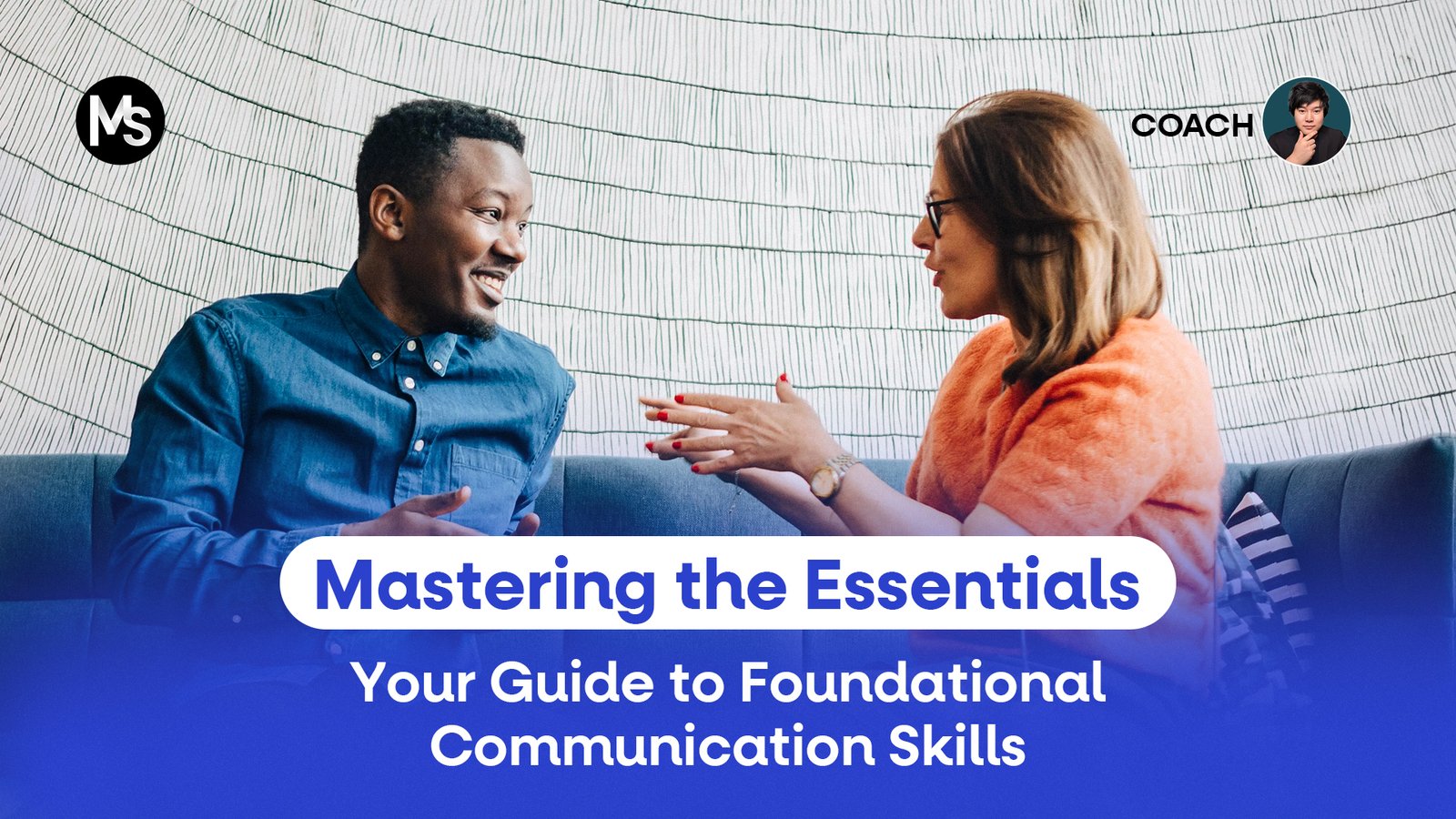Have you ever felt misunderstood? Or perhaps struggled to convey your ideas clearly? In today’s fast-paced world, effective communication isn’t just a soft skill – it’s a fundamental necessity. Whether you’re navigating complex professional environments, nurturing personal relationships, or simply trying to express yourself, your ability to communicate effectively determines your success and happiness.
But where do you start? The journey begins with foundational communication skills – the core abilities that underpin every successful interaction. These aren’t just buzzwords; they are the bedrock upon which all advanced communication strategies are built. In this comprehensive guide, we’ll explore the four pillars of foundational communication Active Listening, Verbal Communication, Non-Verbal Communication, and Written Communication. Master these, and you’ll unlock a world of clearer understanding and stronger connections.
Why Foundational Communication Skills Matter More Than Ever
In an era defined by constant information exchange, the clarity and effectiveness of your message are paramount. Poor communication can lead to costly misunderstandings, strained relationships, missed opportunities, and even professional stagnation. Conversely, strong foundational skills open doors:
- In Personal Life: They foster deeper connections with family and friends, help resolve conflicts peacefully, and enable you to express your needs and feelings authentically.
- In Professional Life: They are crucial for effective teamwork, inspiring leadership, successful client interactions, persuasive presentations, and ultimately, career advancement. From your first interview to leading a complex project, these skills are indispensable.
- In Social Life: They allow you to network effectively, build rapport, understand diverse perspectives, and contribute meaningfully to your community.
Mastering these core skills reduces ambiguity, builds trust, and allows you to influence and connect with others on a profound level.
The Four Pillars of Foundational Communication
Effective communication is a harmonious blend of several abilities. Let’s delve into the four essential pillars that form the foundation of all successful interactions.
Active Listening – Truly Hearing and Understanding
Listening is more than just waiting for your turn to speak. Active listening is the critical skill of fully concentrating on what is being said, rather than just passively “hearing” the message. It involves paying attention to both verbal and non-verbal cues, withholding judgment, and providing verbal and non-verbal feedback to show you understand.
Why is it foundational? Because without truly understanding the other person’s perspective, your response, no matter how articulate, might miss the mark. Active listening builds trust, prevents misunderstandings, and shows genuine respect.
To dive deeper into mastering this crucial skill, read our comprehensive guide on Active Listening: How to Practice Active Listening for Better Conversations
Verbal Communication – Speaking with Clarity and Confidence
Verbal communication is about how you use spoken words to convey your message. This encompasses your choice of vocabulary, your tone of voice, volume, pace, and even your articulation. It’s not just what you say, but how you say it.
Effective verbal communicators speak clearly, concisely, and with confidence. They adapt their language to their audience and ensure their message is easily digestible. Whether you’re participating in a meeting, giving a presentation, or having a one-on-one conversation, your verbal skills significantly impact how your message is received.
Unlock your speaking potential and learn to express yourself powerfully in our detailed article Verbal Communication: Mastering Verbal Communication: Tips for Clear
Non-Verbal Communication (Body Language) – What Your Body Says
Often, what we don’t say speaks volumes. Non-verbal communication, or body language, includes your facial expressions, eye contact, gestures, posture, and even personal space. These cues often convey emotions, attitudes, and intentions more powerfully than words alone.
Understanding and effectively using non-verbal cues is foundational because it adds layers of meaning to your verbal message. Congruence between your words and your body language builds credibility and trust. Misaligned cues, however, can lead to confusion or mistrust.
Discover the hidden language of non-verbal cues and enhance your impact by exploring our in-depth guide Non-Verbal Communication: Understanding Body Language: Decoding Non-Verbal Cues
Written Communication – Conveying Messages Clearly in Text
In our increasingly digital world, written communication has become as vital as spoken words. From professional emails and reports to social media posts and instant messages, your ability to convey ideas clearly and concisely in text is paramount.
Effective written communication demands precision, proper grammar, appropriate tone, and logical structure. It’s about ensuring your message is understood exactly as intended, without the benefit of vocal tone or body language. Mastering this skill is crucial for professional success, remote collaboration, and building a credible online presence.
Hone your written word for maximum impact. Learn the principles in our guide Written Communication: Improving Written Communication: From Emails to Reports
Integrating Foundational Skills for Holistic Communication
While we’ve discussed each foundational skill individually, it’s crucial to understand that they rarely operate in isolation. In real-world interactions, they work in harmony. For instance, when you’re giving feedback:
- Your verbal communication delivers the message clearly.
- Your non-verbal communication (open posture, steady eye contact) conveys sincerity and approachability.
- Your active listening allows you to understand the other person’s perspective and adjust your message accordingly.
- If you follow up with an email, strong written communication ensures clarity and documentation.
This integration creates a powerful, holistic communication approach, fostering deeper understanding and more effective outcomes.
Practical Tips for Developing Your Foundational Communication Skills
Improving these essential skills is an ongoing journey that requires conscious effort. Here are some actionable tips:
- Practice Consistently: Like any skill, communication improves with regular practice. Seek opportunities to engage in conversations, give presentations, and write clearly.
- Seek Constructive Feedback: Ask trusted friends, family, or colleagues for honest feedback on your communication style. What do you do well? Where can you improve?
- Observe Others: Pay attention to effective communicators around you. What makes them impactful? How do they handle difficult conversations?
- Self-Reflection: After an interaction, take a moment to reflect. What went well? What could have been handled differently?
- Be Patient and Persistent: Communication mastery doesn’t happen overnight. Celebrate small improvements and stay committed to the process.
Overcoming Common Barriers to Foundational Communication
Even with foundational skills, challenges arise. Common barriers include:
- Lack of Clarity: Not being specific enough in your message.
- Assumptions: Believing others understand your unstated thoughts.
- Emotional Barriers: Letting emotions cloud your judgment or expression.
- Distractions: Internal or external noise preventing focus.
By strengthening your foundational skills, you develop the tools to identify and actively overcome these barriers, leading to more productive and meaningful exchanges.
Continuous Improvement in Communication
Mastering foundational communication skills is a powerful step towards a more connected and successful life. These core abilities – active listening, verbal clarity, non-verbal awareness, and clear written expression – are the building blocks for every interaction you’ll ever have.
This guide provides the core. For an even more comprehensive deep dive into every facet of communication, be sure to read our ultimate resource The Ultimate Guide to Mastering Communication Skills: From Basics to Advanced Strategies Keep learning, keep practicing, and watch your communication prowess transform your world.



